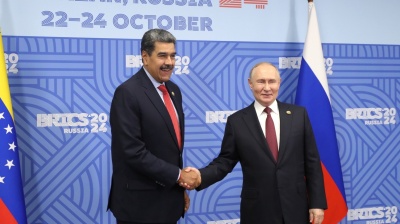The ethnic Armenian inhabitants of the breakaway territory of Nagorno-Karabakh, which surrendered to Azerbaijan last Wednesday, are in mass flight to Armenia.
Social media carried photos of huge queues of cars leaving the territory in the direction of Armenia. Armenia's government said that almost 6,500 refugees had entered the country by 5pm local time on September 25.
Refugees are fleeing from areas occupied by Azerbaijani forces, as well as from areas that are poised to be occupied by them, in what risks becoming a humanitarian disaster.
“There are no words to describe [it],” one refugee told The Associated Press about their plight. “The village was heavily shelled. Almost no one is left in the village.”
In a statement the US government said it was “deeply concerned about reports on the humanitarian conditions in Nagorno-Karabakh and calls for unimpeded access for international humanitarian organisations and commercial traffic”.
Armenian Prime Minister Nikol Pashinyan had advised the territory’s 120,000 residents last week not to leave but thousands have begun a mass exodus along the Lachin Corridor to Armenia rather than risk living under Azerbaijani rule. The road, which Azerbaijan has been blocking since December, is the territory’s only link with the outside world.
In an address on September 24, Pashinyan – who is facing huge domestic criticism and protests over the fall of Nagorno-Karabakh – said Azerbaijan was planning ethnic cleansing, and he admitted that a mass exodus now looked inevitable. Space for 40,000 people from Karabakh had been prepared in Armenia, Reuters reported.
"If proper conditions are not created for the Armenians of Nagorno-Karabakh to live in their homes and there are no effective protection mechanisms against ethnic cleansing, the likelihood is rising that the Armenians of Nagorno-Karabakh will see exile from their homeland as the only way to save their lives and identity," Pashinyan said.
There were more demonstrations against Pashinyan on September 25, with more than 200 protesters detained.
Nagorno-Karabakh won self-rule in the early 1990s after the collapse of the Soviet Union but its declaration of independence has never been internationally recognised, even by Armenia. Its position was severely weakened in 2020 when Azerbaijan retook much of its lost territory.
Under the ceasefire Nagorno-Karabakh forces have begun handing in their arms following their surrender last week after a sudden 24-hour offensive by Azerbaijani forces. On the Nagorno-Karabakh side more than 200 people were killed and 400 were wounded in the Azerbaijani attack. Baku has not released casualty figures.
Ethnic Armenian residents of the territory lost in 2020 fled their homes and now many residents of the remaining rump statelet are expected to follow them.
"Ninety-nine point nine per cent prefer to leave our historic lands," David Babayan, an adviser to Nagorno-Karabakh’s’ president Samvel Shahramanyan told Reuters.
"The fate of our poor people will go down in history as a disgrace and a shame for the Armenian people and for the whole civilised world," Babayan said. "Those responsible for our fate will one day have to answer before God for their sins."
Nagorno-Karabakh leaders have said that all those wanting to leave the territory would be escorted to Armenia by Russian peacekeepers. Several thousand of those displaced by the recent fighting are already camped at the main airport, the base for the peacekeepers.
Talks on guarantees for the residents are continuing between Azerbaijani officials and representatives of the Nagorno-Karabakh government. Baku has pledged to respect the rights of the inhabitants of its breakaway region. Azerbaijan dictator Ilham Aliyev has said that the region would be turned into a "paradise". Baku has also begun to allow humanitarian aid to enter the territory, after blocking shipments for nine months.
The statements of Aliyev and his officials are widely dismissed because of Azerbaijan’s previous behaviour and its repression of dissent at home.
There is widespread fear that Azerbaijani forces will expel ethnic Armenians and will make reprisals against those who took part in the fighting over the past three decades, and those who led them. In recent weeks some ethnic Armenians who travelled through the Azerbaijani checkpoint on the Lachin Corridor have been arrested.
Hikmet Hajiyev, an adviser to Aliyev, told the Financial Times that Baku plans to fully absorb and integrate Nagorno-Karabakh, giving it no special autonomous status within Azerbaijan. He also said Baku was planning an “amnesty” for all Nagorno-Karabakh residents who served in separatist forces or with the Armenian army but that would not extend to “criminals, who have . . . used crimes against humanity and war crimes against Azerbaijani civilians. That is a separate story.”
News

BP expands gas output in Egypt’s West Nile Delta with new well start-up
British energy major BP (LSE, NYSE:BP) has started up the RW5 gas well in Egypt’s West Nile Delta (WND) project, adding around 80mn cubic feet per day of additional supply.

APEC meeting closes in South Korea, WTO dead and buried
This was not a summit. It was a eulogy for the WTO, and APEC just lowered the flag to half-mast.

Turkish state grabs another fintech as company seizures continue at pace
Turkey first seizes companies, then tries the suspects. Some companies are sold before the trial process.

Ukraine’s elite HUR forces turn the tide in the battle for Pokrovsk, as Russia’s effort to capture key logistics hub fails
The battle for Pokrovsk became intense early on November 1and it looked like the fall of the key logistics hub to Russia was imminent. But a bold counterattack by Ukraine’s elite HUR forces seems to have turned the tide.




